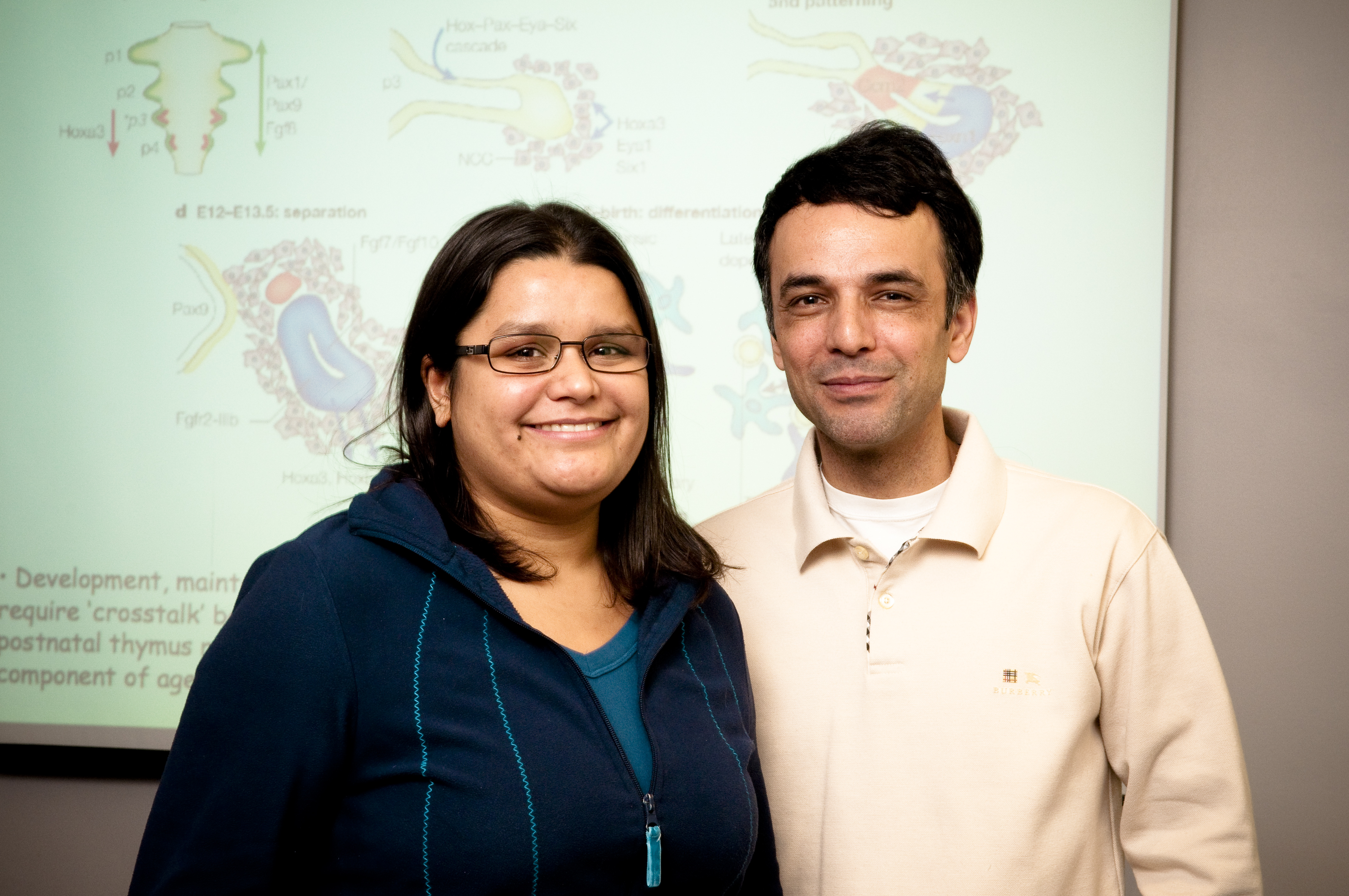A Tradition That Serves
By Jim Oldfield
Journal clubs—generally genial get-togethers in which a stressed student is enticed by free refreshments to explicate the findings of a recent scholarly paper for discussion among colleagues—have a long if mostly undocumented history dating back to the mid-19th century. The purpose of these gatherings, one of the first formal instances of which was hosted at McGill University in 1875 by Sir William Osler (a Canadian physician, historian and founding father of modern medical education), was to stay abreast of new findings; hone critical reading and presentation skills; and share periodicals, which were expensive and rare then. Scarcity of journals is a problem hard to fathom these days—papers and even the journal club discussions they generate are now online—but the intentions and utility of the contemporary journal club remain unchanged.
In 2008 Dr. Divya Shah, a postdoctoral fellow in Dr. Juan Carlos Zúñiga-Pflücker’s lab, organized the immunology journal club, which meets every Tuesday at 1 p.m. in A3 30. (Dariush Tahamzadeh is the coordinator for 2009.) Mehran Haeri, a graduate student in the lab of Dr. Yaacov Ben-David, runs the molecular and cellular biology (MCB) journal club, which convenes every other Thursday at 1 p.m. in SG 22.
Here, they discuss why they got involved and what they like about their clubs.
What do people get from journal club?
Shah: We cover a lot of topics within immunology, so it keeps us up to date. You can get general ideas about a subject, or if the paper is specific to your research area, it helps you know what’s current in your field. Also, if you’re presenting, it’s good for practising critical evaluations of the papers. You improve your presentation skills, critical thinking and ability to convey information from the paper to the group; and of course, you get better at answering questions. I do more background reading when I’m presenting, and I often come across something I didn’t know before.
Haeri: The main way researchers learn about what others are doing is through reading papers. Reading a paper, for a researcher, is absolutely crucial and fundamental. The better a researcher is at reading and interpreting a paper, and discussing it, the more successful he or she will be. If I want to learn something small from a paper, without reading the whole thing, it’s useful to be able to go to a specific part, maybe just the discussion or certain results. This is a necessary skill that saves time, and which researchers should develop. Having to present a paper is good for the speaker’s reading skills, and at the same time, it helps the audience develop theirs.
What kind of format do you prefer?
Shah: The immunology club is very informal in that there are questions throughout—it’s not like you present and questions are kept for the end. People are free to interrupt, and that seems to work well, to make it interactive. I also like the roundtable format: it feels more friendly than a lecture theatre and encourages conversation, although we can get pressed for space.
Haeri: Science is all about discussion, and with the MCB club, there are always questions after the presentation. It’s good to hear other points of view, and when people disagree—with logic—it makes their ideas more appealing. Also, regular meetings are a good habit. Even if people are motivated to read papers, and many are, keeping to a schedule is good, otherwise, maybe they’d do other stuff.
Is presenting an intimidating experience?
Shah: Some people feel pressured, but I don’t put pressure on them. I don’t ask the first-years to present until the end of the season; they have classes and clubs downtown. From second year on I do ask. Some people book and then cancel, which is OK. In the meetings, there are differing opinions, but it’s quite friendly overall. I wouldn’t say there’s too much pressure.
Haeri: It is intimidating, but that’s true of all presentations. People like to put it off, but they often agree it’s good for them when I bring it up. A few years ago I was a student at Guelph, and Dr. Carlton Gyles, a famous microbiologist and a very active guy, was chosen to receive an award and give a talk. Before the talk he was having lunch with some students, and one of us made a joke about him being nervous, even though he was nearing retirement age. And he surprised us. He said, “Actually, I am nervous. And you know what? It’s a normal reaction.” So I think no matter what someone’s level, if there’s no stress—then we should worry.






